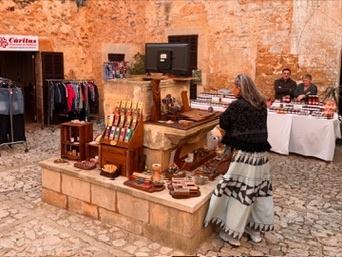How are the names of Mallorcan festivals connected to local saints and patron figures?
Similar Topics
mallorcan festivals
local saints
patron figures
sant joan
st. john baptist
religious devotion
virgin mary advocations
mare de déu
The names of Mallorcan festivals are deeply intertwined with the island’s rich religious and cultural heritage, often reflecting the veneration of local saints and patron figures. Many of these festivals are named directly after the saints they honor, underscoring the importance of religious devotion in Mallorcan community life. For instance, the festival of Sant Joan, celebrated with bonfires and fireworks in June, commemorates St. John the Baptist, a figure revered across Mallorca for his spiritual significance. Such names serve both as a tribute and as a reminder of the island’s long-standing Christian traditions.
In addition to direct naming, some festivals reflect the patronage of local historical figures who have been granted sainthood or beatification over centuries. These figures are celebrated as protectors of towns or professions, and their feast days provide occasions for vibrant public gatherings. The usage of saint names in festival titles not only honors their legacies but also helps preserve Mallorcan identity, linking the present community to its ancestral past. The religious ceremonies, processions, and public festivities associated with these named events create a sense of unity while also attracting visitors eager to witness Mallorca’s cultural depth.
Beyond individual saints, certain festivals incorporate the names of Virgin Mary advocations specific to Mallorca, such as the Mare de Déu de Lluc, the island’s patron saint. These names highlight the islanders’ devotion to local Marian icons, which hold a central place in Mallorcan spirituality. The festivals named after these figures often blend religious solemnity with folkloric customs, including traditional music, dance, and cuisine. This fusion makes the festivals not only acts of faith but collective celebrations of Mallorcan history and social cohesion, all embedded within the names that carry centuries of reverence and communal pride.
In addition to direct naming, some festivals reflect the patronage of local historical figures who have been granted sainthood or beatification over centuries. These figures are celebrated as protectors of towns or professions, and their feast days provide occasions for vibrant public gatherings. The usage of saint names in festival titles not only honors their legacies but also helps preserve Mallorcan identity, linking the present community to its ancestral past. The religious ceremonies, processions, and public festivities associated with these named events create a sense of unity while also attracting visitors eager to witness Mallorca’s cultural depth.
Beyond individual saints, certain festivals incorporate the names of Virgin Mary advocations specific to Mallorca, such as the Mare de Déu de Lluc, the island’s patron saint. These names highlight the islanders’ devotion to local Marian icons, which hold a central place in Mallorcan spirituality. The festivals named after these figures often blend religious solemnity with folkloric customs, including traditional music, dance, and cuisine. This fusion makes the festivals not only acts of faith but collective celebrations of Mallorcan history and social cohesion, all embedded within the names that carry centuries of reverence and communal pride.
🧩 Related Questions
Related Question
How do stone walls in Mallorca affect the behavior of predator and prey species in the area?
Related Question
What role does Trempo play in Mallorcan tapas competitions or food fairs?
Related Question
What role did the Catalan language play in shaping Mallorcan surnames, and how is this visible today?
